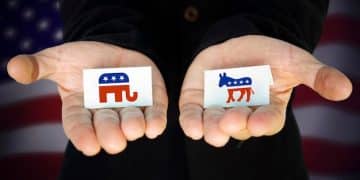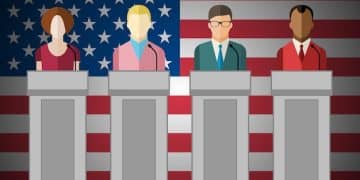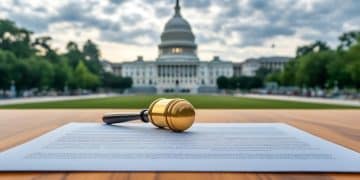Potential Implications of Congressional Investigations on US Political Figures
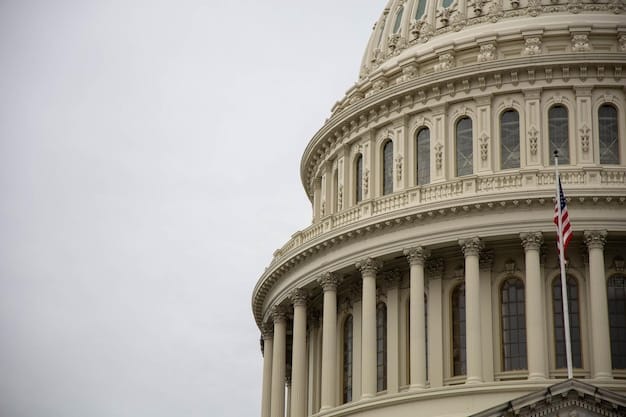
Congressional investigations into political figures can lead to a range of potential implications, including legal consequences, reputational damage, political setbacks, and policy changes, significantly impacting their careers and the political landscape.
Congressional investigations into political figures are a common occurrence in the United States. The potential implications of these investigations can be far-reaching, affecting not only the individual under scrutiny but also the broader political landscape. Understanding these implications is crucial for anyone following US politics, as they can shape careers, influence policy, and alter public perception. This article explores what are the potential implications of the latest congressional investigations on political figures.
Understanding the Scope of Congressional Investigations
Congressional investigations are a powerful tool used by the United States Congress to oversee the executive branch, gather information for potential legislation, and inform the public about important issues. These investigations can target political figures, holding them accountable for their actions and ensuring transparency in government.
The Authority of Congressional Committees
Congressional committees have broad authority to conduct investigations. They can issue subpoenas, compel testimony, and gather documents. This authority is essential for uncovering information and ensuring that individuals and organizations comply with the committee’s requests.
Types of Congressional Investigations
Congressional investigations can take various forms, including hearings, document reviews, and interviews. Each type of investigation serves a specific purpose, whether it’s gathering testimony from witnesses, examining financial records, or assessing the effectiveness of government programs.
- Oversight Investigations: These inquiries focus on overseeing the executive branch and ensuring that laws are being properly implemented.
- Legislative Investigations: These investigations seek information to inform potential legislation and policy changes.
- Impeachment Inquiries: These are formal investigations to determine if there is enough evidence to impeach a high-ranking government official.
Congressional investigations serve as a critical check on power, ensuring accountability and transparency in government. Understanding the scope and authority of these investigations is essential for grasping their potential implications on political figures.
Legal Consequences: Indictments and Criminal Charges
One of the most significant potential implications of congressional investigations is the possibility of legal consequences. Evidence uncovered during an investigation can lead to indictments and criminal charges, resulting in fines, imprisonment, or other penalties.
The Role of the Department of Justice
If a congressional investigation uncovers evidence of criminal activity, the matter may be referred to the Department of Justice (DOJ). The DOJ then has the authority to conduct its own investigation and, if warranted, file criminal charges.
Examples of Indictments
Throughout history, numerous political figures have faced indictments as a result of congressional investigations. These cases highlight the serious legal risks associated with government service and underscore the importance of ethical conduct.
Impact on Political Career
Indictments and criminal charges can have a devastating effect on a political figure’s career. Even if acquitted, the cloud of suspicion can linger, making it difficult to regain public trust and remain in office.
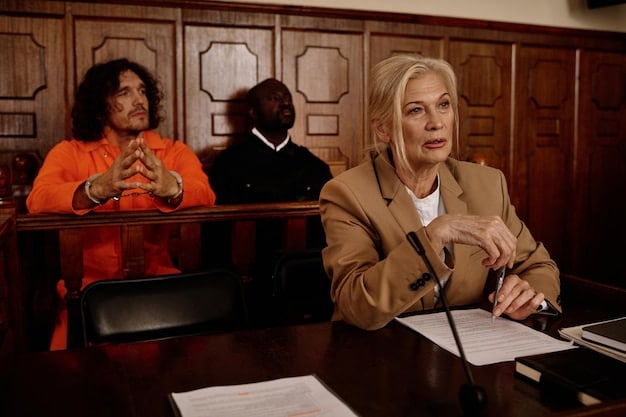
The legal consequences of congressional investigations can be severe, potentially leading to indictments and criminal charges that can derail a political figure’s career. The referral of evidence to the Department of Justice further underscores the gravity of these investigations.
Reputational Damage: Erosion of Public Trust
Even if a political figure avoids legal consequences, a congressional investigation can still inflict significant reputational damage. The exposure of questionable behavior or unethical conduct can erode public trust and undermine their credibility.
Media Coverage and Public Perception
Congressional investigations often receive extensive media coverage, which can shape public perception. Negative press can amplify the reputational damage and make it difficult for a political figure to maintain a positive image.
Loss of Support
Reputational damage can lead to a loss of support from constituents, donors, and fellow politicians. Without this support, a political figure may find it challenging to remain effective or viable in their role.
Long-Term Effects
The reputational damage from a congressional investigation can have long-term effects, even after the investigation concludes. The negative associations can linger, making it difficult for the political figure to rebuild their reputation.
- Public Scrutiny: Investigations bring increased scrutiny, potentially revealing missteps that would otherwise go unnoticed.
- Damage Control: Politicians must engage in damage control to mitigate negative perceptions, which can be costly and time-consuming.
- Erosion of Influence: A damaged reputation can weaken a politician’s influence and ability to enact policies.
Reputational damage is a significant consequence of congressional investigations, leading to erosion of public trust, loss of support, and long-term negative effects on a political figure’s career.
Political Setbacks: Loss of Elections and Influence
Congressional investigations can lead to political setbacks, including the loss of elections and a decrease in political influence. The scrutiny and negative publicity associated with an investigation can make it difficult for a political figure to win elections or effectively lead.
Impact on Election Campaigns
A congressional investigation can derail an election campaign. Opponents may use the investigation as ammunition, highlighting the allegations and questioning the candidate’s integrity. Voters may be less likely to support a candidate under investigation.
Reduced Influence in Congress
Even if a political figure survives an investigation and remains in office, their influence in Congress may be diminished. Colleagues may be less willing to work with them, and they may lose key committee assignments or leadership positions.
Challenges to Future Political Ambitions
Congressional investigations can create significant challenges for future political ambitions. The stigma associated with being investigated can make it difficult to pursue higher office or gain support for future campaigns.
Political setbacks are a common consequence of congressional investigations. The loss of elections and influence can significantly impair a political figure’s ability to serve and advance their political goals.
Policy Changes: Reforms and New Regulations
In some cases, congressional investigations can lead to policy changes, including reforms and new regulations. The exposure of problems or abuses can create momentum for legislative action, resulting in new laws designed to prevent future misconduct.
Legislative Responses
When congressional investigations reveal systemic problems or loopholes in existing laws, legislators may respond by introducing new bills or amendments. These legislative responses can address the specific issues uncovered during the investigation and strengthen oversight mechanisms.
Increased Scrutiny of Government Practices
Congressional investigations can lead to increased scrutiny of government practices. Agencies may be required to implement new safeguards or internal controls to prevent future misconduct. This increased scrutiny can promote greater accountability and transparency.
Examples of Policy Changes
Several notable policy changes have resulted from congressional investigations. These examples illustrate the potential for investigations to drive meaningful reforms and improve government operations.

Policy changes are an important potential outcome of congressional investigations. The exposure of problems and abuses can create the impetus for legislative action, resulting in reforms and new regulations that promote greater accountability and transparency.
Public Opinion and Political Polarization
Congressional investigations can significantly influence public opinion and contribute to political polarization. The way these investigations are perceived and reported can shape how the public views political figures and institutions.
Impact on Public Trust
The findings of congressional investigations can either erode or reinforce public trust in government. If an investigation uncovers wrongdoing, it can damage public confidence. However, if an investigation is seen as fair and thorough, it can enhance trust.
Polarizing Effects
Congressional investigations often have polarizing effects, with supporters and opponents of the political figure under investigation taking sharply different views. This polarization can intensify political divisions and make it more difficult to find common ground.
The Role of Media
The media plays a significant role in shaping public opinion during congressional investigations. The way the media frames the investigation and reports on its findings can influence how the public perceives the political figure and the issues involved.
- Shaping Narratives: Media coverage shapes public narratives around investigations, influencing opinions and beliefs.
- Amplifying Division: Polarizing investigations can widen political divides, making consensus more challenging.
- Accountability: Media scrutiny holds both investigators and the investigated accountable for their actions.
Congressional investigations can significantly influence public opinion and contribute to political polarization. The impact on public trust and the role of the media are key factors in shaping these dynamics.
Conclusion
Congressional investigations into political figures have far-reaching implications. From legal consequences and reputational damage to political setbacks and policy changes, these investigations can significantly impact individuals and the broader political landscape. Understanding these implications is essential for informed citizens and policymakers alike, as they shape the course of US politics and government.
| Key Point | Brief Description |
|---|---|
| ⚖️ Legal Repercussions | Indictments, criminal charges, and potential penalties. |
| 📉 Damage to Reputation | Erosion of public trust and credibility. |
| 🗳️ Political Setbacks | Loss of elections and decreased influence. |
| 📜 Policy Shift | Reforms and new regulations as a result. |
Frequently Asked Questions
▼
A congressional investigation aims to oversee the executive branch, gather data for potential legislation, and inform the public about significant political issues.
▼
Legal outcomes might include indictments and criminal charges from the Department of Justice if any illegal activities by political figures are discovered during investigations.
▼
Investigations often lead to reputational damage through media scrutiny, which erodes public trust and affects the politician’s ability to maintain a respected public image.
▼
Yes, investigations can uncover systemic problems, prompting legislative changes that introduce new laws and strengthen oversight mechanisms in the government.
▼
The media plays an important role in shaping public opinion through their reporting of investigations, influencing how the public views the associated political figures and issues.
Conclusion
In summary, the implications of congressional investigations on political figures can be profound and varied. These investigations not only carry legal and reputational risks but also have the potential to reshape policy and influence public perception, highlighting their critical role in maintaining accountability and transparency in government.
